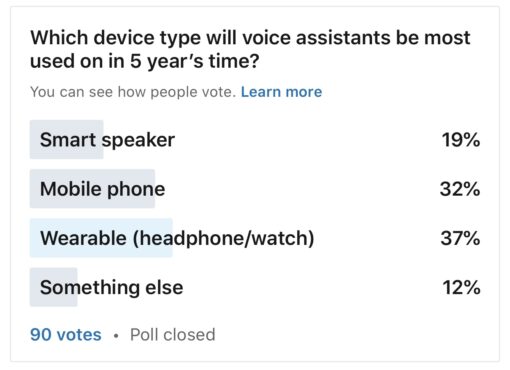With the latest developments in Alexa functionality announced at Alexa Live 2020, Amazon has shown a glimpse into its advancing Alexa strategy, and how it’s trying to make up for a long-standing weakness. Here’s the what, why and how.
Before we look at where it’s been taken, we should set some context on where Amazon’s Alexa strategy has been and why.
Need help with your Amazon Alexa strategy? Try our strategy sprint.
Alexa Everywhere
For years, Amazon’s Alexa strategy has been ‘Alexa Everywhere’, which has aimed to put Alexa into everything imaginable. From smart speakers and headphones, to microwaves, rings, clocks, cars and anything else you can think of.
This is Amazon’s play to make Alexa the go-to voice assistant.
This is the #Amazon play to make #Alexa the go-to #voiceassistant Click To TweetWhy Alexa needs to dominate the voice assistant market
One of the main reasons Amazon needs Alexa to be the dominant voice assistant is that the dominant becomes the default.
Think about it.
Google became the dominant search provider. Now it’s the default search provider, even on the phones of rival operating systems, devices and browsers.
Facebook became the dominant social network. Now it’s the default. (It’s not without its challengers: TikTok, SnapChat, WeChat etc, but Instagram, What’sApp and Facebook combined are the default social and messaging tools for entire generations of people across the world)
The reason #Amazon needs #Alexa to be the dominant #voiceassistant is that the dominant becomes the default. Click To TweetNetflix, Android, Amazon, Windows, Visa, the list goes on. Become dominant enough to form habitual behaviours, then turn those behaviours into internalised triggers that have people reaching for your service whenever they have an itch to scratch, and you win. Or, partner with enough companies that you end up being the default option for your service in their ecosystems, and you win.
The importance of being the default voice assistant
When you’re the default service provider in a given market, you take all the spoils. It takes too much effort for people to switch, so as long as you don’t do anything stupid, you’ll have users for life.
Being the default search provider made Google the starting point, the entry point, the gatekeeper, to the internet. The rest is history.
The untrained eye might think that its all about #smartspeaker market share, but #Google and #Amazon are fighting to become the new default access point to the #internet Click To TweetNow that people are becoming more comfortable talking to their devices, they’re realising how much easier using their voice is. It’s only a matter of time before we instinctively and habitually use our voice to do most of the things we need to do, from researching and buying products, finding information, being entertained, managing our life and work, finding a new job, house… Everything. And it’ll happen sooner than you think.
Amazon knows this, as does Google, hence the battle we’re seeing now.
The untrained eye might think that this is all about smart speaker market share, but the reality is that these two companies are fighting to become the new default access point to the internet and the control centre of your home, your work, your life; for life.
Challenging Google’s dominance
So how do you do it? How do you become the new default entry point to the internet? How do you become the default voice assistant?
Well, first you need usage. Then you need repeat usage. Then you need habitual usage.
BUT, before you get any usage whatsoever, you need to create two things: availability and access.
And this is what the last 4 years have been all about for the Alexa Everywhere strategy.
Alexa’s quest for access
The single most important stage in the adoption of new technology and in cementing your position as the no. 1 voice assistant in the world is to enable access to it.
That means you need to make it available in enough places so that Alexa is able to be called upon, no matter where you are in the world, what environment you’re in, what your budget is and what device you have with you, Alexa needs be be there and ready to talk.
Amazon has dominated smart speaker market share, China excluded, since day 1, but it knows that the home is only one environment it needs to own. What happens when you’re not home?
This is why Amazon has invested so heavily in making Alexa available in cars with both direct integration through Alexa Auto SDK and the Echo Auto. It’s also the reason why we’re seeing all of those other wearable devices like headphones and hardware integrations made possible by the Alexa Voice Service (AVS).
Amazon has always had one weakness when it comes to Alexa
So where is that weakness?
Mobile.
The one device that most people on the planet already have 24/7 access to.
Microsoft found that Siri and Google Assistant are the two most used voice assistants, despite Amazon’s dominance in the smart speaker market.
So where is the #AmazonAlexa weakness? #Mobile - The one device that most people on the planet already have 24/7 access to. Click To TweetWhy? Mobile. They both own the two most common mobile operating systems in the world.
Owning the operating system
And why is owning the operating system important?
Access!
It’s all about access.
If you own the operating system, you control access to the native voice assistant of that OS.
You could class Alexa an an operating system in its own right. On Alexa-first devices, like Echos, that’s exactly what it is. Amazon controls the access, not just to Alexa, but to all of the other thousands of third party apps built on the OS.
On mobile, that privilege is granted to Google and Apple. They both control the access point in their respective OS with native wake word detection.
The power of owning wake-word detection
Owning wake-word detection is crucial. Not only does it allow you to control access to the native assistant, you also intermediate access to all of its second and third party services. And on mobile right now, that’s all Alexa is: a third party service.
That’s why ‘Hey Siri’ and ‘Hey Google’ are the two most important phrases for Apple and Google right now, even if Apple doesn’t know it.
That’s why #HeySiri and #HeyGoogle are the two most important phrases for #Apple and #Google right now, even if Apple doesn’t know it. Click To TweetWe have our phones on us most of the time, and if that’s all you have access to, and you say “Alexa”, Alexa isn’t going to do diddly squat because it can’t hear you. Despite being available on mobile via the Alexa app, Alexa is difficult to access on mobile.
You can create as many new devices as you can think of, but you’ll have a hard time displacing the mobile phone any time soon. And so, without a mobile phone, and direct access to wake-word detection, Amazon is constantly at the mercy of Google and Apple in the one space where voice arguably has the most potential.

We recently ran a poll on LinkedIn asking ‘Which device type will voice assistants be used most on in 5 year’s time?’ Most people voted for Wearables, closely followed by Mobile.
So how does Amazon compete on mobile?
How do you get around not owning the most ubiquitous device the world has ever seen?
Well, you integrate with it. Deeply.
And this is Amazon’s latest advancement in its Alexa strategy: to integrate as deeply as possible with the existing mobile operating systems.
Ways Amazon is integrating Alexa with mobile
There are a number of ways Amazon is intergrating Alexa deeper into the mobile ecosystems of iOS and Android, including:
- Wake word detection in the Alexa app. Right now, when you open the Alexa app in your phone, you can just say “Alexa” to invoke it, rather than having to tap on the Alexa icon. Couple this with a Siri shortcut and you’re almost able to get to Alexa in one utterance. Not quite, but nearly. It’s a step forward in making Alexa more accessible by trying to hack its way around native wake word detection.
- Deep links into apps from an Alexa skill. This means that, when you’re using an Alexa skill, Alexa can hop you out of the Alexa app and deep link into another app you have installed on your phone, from within a skill. Let’s say you have a banking skill and you ask it to transfer you money or open an account, rather than the skill fulfilling that request, it’ll open the bank app you have on your phone right at the ‘transfer money’ or ‘open an account’ page. (Google has had this for a while, it’s called app actions)
- Quick links into skills from mobile devices. This is the ability to click a link on a social post, an advert, an email, any online destination, and have the link fire up a skill on the Echo device nearest to you. It essentially uses you phone as a launchpad to enable and open a skill.
- App-to-app account linking. To access personal or secure information and services on Alexa, you need to link your Amazon account with your service provider. For example, if you shop with Tesco or Walmart, to shop on Alexa, you’d need to link your Tesco/Walmart account with you Amazon account. This process is usually pretty clunky. Now, app-to-app account linking makes that easier by allowing you to link an account right there in the Alexa app when you enable the skill.
All of these features show that Amazon is attempting to break into the current mobile ecosystems of Apple and Android and have trying to enable easier access to Alexa in a core place where it’s already available.
Is it enough?
Alexa will always struggle to overcome the challenges of being a third party app, rather than the operating system’s native assistant, but for now, it’s doing all it can to slide its way into as many mobile spaces as possible.
Don’t be surprised to see #Amazon talking #mobile more often, and to see more mobile integrations and functionality arrive down the road. Click To Tweet Perhaps we’ll even see another Amazon phone (the Phoenix? – hat tip: Sam Sethy).
But for now at least, the Alexa Everywhere strategy has a few more tentacles. It shows that Amazon is acknowledging a weakness in it’s Alexa Everywhere strategy, and is doing what it can to compete for access on the one device that already is everywhere, and is unlikely to go anywhere anytime soon.




